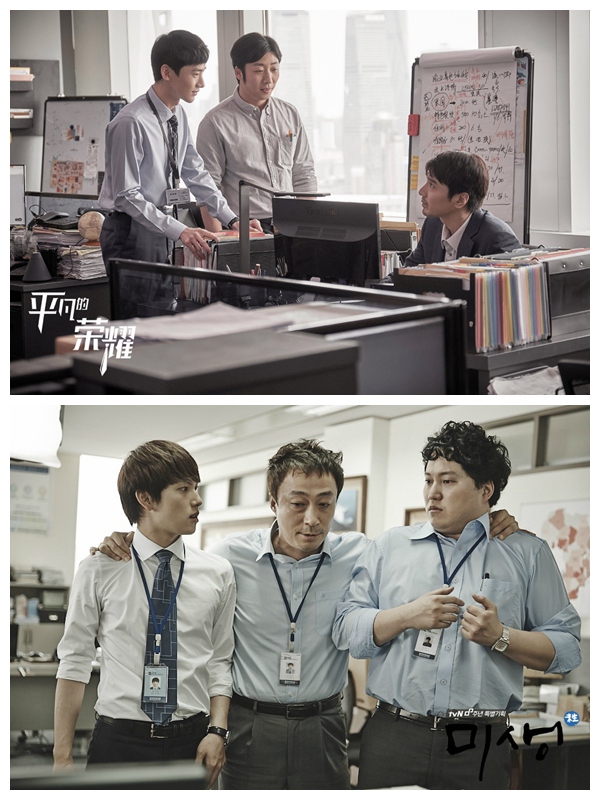
(L-R) Posters for "Miss S," "The Ordinary Glory" and "Midnight Food Store".
(L-R) Posters for "Miss S," "The Ordinary Glory" and "Midnight Food Store".
Ask any Chinese TV lover about local remakes of foreign dramas, and they'll tell you these shows are doomed to tank. Yet, judging by how ubiquitous such productions are, screenwriters seem to have missed the memo.
Chinese copycats of titles originating overseas – from Japan to South Korea to Australia – have taken over TV channels and streaming services in recent years. But the reception has been largely lukewarm as the cloned plots fail to strike a chord with the audience for being uncharacteristic and unconvincing of Chinese society and culture.
Audiences have voted with their fingers, either giving these remakes the thumbs-down online or reaching for the remote control to change the station.
"The Ordinary Glory," an adaptation of the 2014 South Korean TV series "Misaeng," tells the story of workplace struggles endured by a group of fresh graduates.
The original series has been called a textbook example of the predicament of the working class in the hierarchical corporate culture of South Korea, receiving an impressive 9.3 out of 10 on Douban, the Chinese equivalent of Rotten Tomatoes. Meanwhile, its Chinese copy got 7.7 points, a high score considering other remakes like "Midnight Food Store" which pocketed an insignificant 2.9 points, but not as monumental as the original version's feat.
The same pattern could be seen with "Miss S," the remake of Australia's "Miss Fisher's Murder Mysteries." The Chinese version received a score of 6.7, while the first three seasons of the original series racked up an overage of 8.5 points.
So what is happening?

Stills from "The Ordinary Glory" (above) and "Misaeng" (below).
Stills from "The Ordinary Glory" (above) and "Misaeng" (below).
In the case of "The Ordinary Glory," Chinese audiences complained about mechanical parroting of characters and insufficient adaptation to local culture and conditions.
"The TV series apparently failed in localization. I could tell from the details that it was adapted from a South Korean drama," a Douban user said. "The actors have trouble acting as well, and they are imitating the original characters."
"It is a typical Chinese remake. The biggest problem is the failed localization, and the depiction of the workplace is far from real life here in China," another said.
One critical view said the Chinese adaptation did not capture the essence of the original work, which criticized institutionalizing office workers and the coldness of personal relations among them.
"Without (societal) preconditions, the (Chinese) characters turned out flat, and their expressions weak and blank," the analysis said.
Chinese viewers' discontent with "Miss S" also stems from the lack of adapting the series to Chinese settings. While the costume designs adapted Miss Fisher's Jazz Age dresses and hairstyle to 1920s Shanghai, the narrative was monotonous and flavorless.

Stills from "Miss S" (R) and "Miss Fisher's Murder Mysteries"(L).
Stills from "Miss S" (R) and "Miss Fisher's Murder Mysteries"(L).
"Copy and paste" is what Chinese audiences use to describe the remakes of hit dramas from overseas – a mindless work of imitation that doesn't take into consideration either the original work or the target market. It's an accusation hurled at producers for being insincere and careless about their work, which mostly consists of translating the script into Mandarin and not much else.
For instance, the 2017 Chinese remake of the "Midnight Food Store" takes place in an izakaya, a type of Japanese bar fashioned after the Japanese TV drama "Midnight Diner." But the set felt alien and detached from the reality in China where hungry city dwellers are accustomed to food stalls, street vendors and mom-and-pop eateries.
Many wondered why the remake of the Japanese series didn't leverage the long and storied culinary history of China while maintaining the frame of the original story.
There's a common belief that Chinese producers attempt to ride the wave of success that these dramas enjoy on their home turf by importing their formula with little to no modifications into the Chinese market, thinking applause and praise would follow.
In the process, they fail to truthfully represent the issues tackled in the original work and the story's many different layers. Such is the case of the remake of South Korean drama "Kill Me, Heal Me," which focused on the romantic-comedy elements of the plot, without reflecting its commentary on child abuse, domestic violence and mental health.